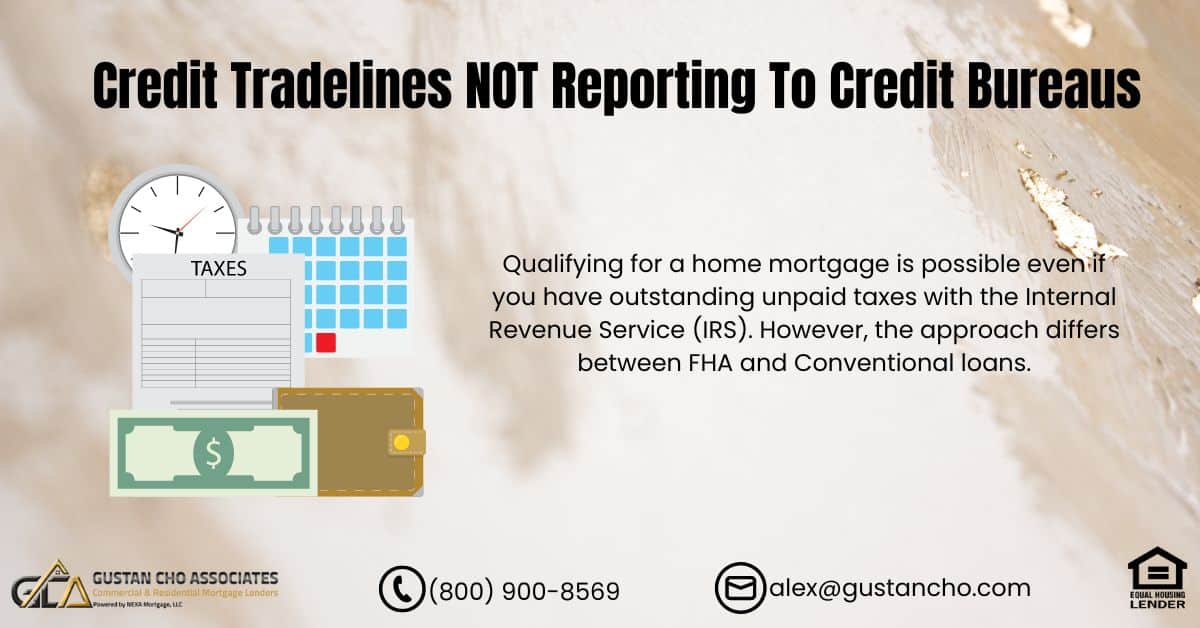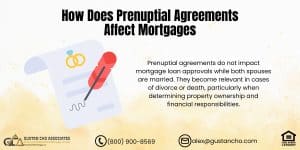This article focuses on Mortgage Guidelines With Unpaid Taxes owed to the IRS for borrowers.
The Mortgage Guidelines With Unpaid Taxes to the IRS vary depending on the specific mortgage loan program. We will delve into Mortgage Guidelines With Unpaid Taxes for both FHA and Conventional loans. Qualifying for a home mortgage is possible even if you have outstanding unpaid taxes with the Internal Revenue Service (IRS). However, the approach differs between FHA and Conventional loans.
HUD, the governing body of FHA, permits borrowers with outstanding federal tax liens to qualify for an FHA loan. On the other hand, Fannie Mae and Freddie Mac allow borrowers who owe back taxes to the IRS but do not extend eligibility to those with outstanding tax liens for conventional loans.
In this discussion, we will cover qualifying for an FHA or Conventional loan when outstanding taxes are owed to the IRS. The qualification process for a mortgage with outstanding tax debts is akin to a mortgage with judgments.
Can I Get a Mortgage with Unfiled Taxes?
Obtaining a mortgage with unfiled taxes can present challenges but is not impossible, depending on the circumstances and the lender’s policies under Mortgage Guidelines With Unpaid Taxes. Generally, lenders require borrowers to have filed tax returns for the past two years as part of the mortgage application process.
Unfiled taxes may raise red flags for lenders as they assess a borrower’s income and financial stability.
However, there are avenues to explore for mortgage approval:
- FHA Loans: The Federal Housing Administration (FHA) may consider borrowers with unfiled taxes if they have a structured payment plan with the IRS and can provide documentation of this arrangement. Meeting FHA guidelines and demonstrating a proactive approach to resolving tax issues can improve the chances of approval.
- Conventional Loans: Some lenders offering conventional loans may review cases of borrowers with unfiled taxes on a case-by-case basis. When evaluating the application, they may consider factors such as a solid payment history, a plan to address the tax matter, and overall financial stability.
- Private Lenders: Private or non-traditional mortgage lenders might have more flexibility in considering borrowers with unfiled taxes. However, they may impose stricter terms or higher interest rates due to the perceived risk.
Open communication with lenders is crucial when seeking a mortgage with unfiled taxes. Providing documentation of any payment plans with the IRS and demonstrating efforts to rectify the tax situation can bolster your chances of mortgage approval under Mortgage Guidelines With Unpaid Taxes. Qualify for a mortgage loan in Taxes, click here
Mortgage Guidelines With Unpaid Taxes: Tax-Debt Versus Tax-Lien
Federal taxes need to get paid. Even though consumers filing bankruptcy, federal taxes are not exempt from a bankruptcy discharge. Borrowers who owe money to the Internal Revenue Service can still qualify for a mortgage under certain circumstances. One thing consumers need to realize is there is a big difference between owing back taxes and having a tax lien filed against you.
The Internal Revenue Service is very generous and negotiable if you contact them with outstanding taxes you cannot pay. The IRS is more than willing to negotiate with you on a written payment agreement.
How Do Lenders Know You Owe Taxes?
Firstly, they often review the borrower’s credit report as part of the application process. Any tax liens or unpaid taxes typically appear on credit reports, providing lenders with a clear picture of the borrower’s tax obligations.
Lenders have multiple ways of determining whether a borrower owes taxes, especially when considering mortgage applications under Mortgage Guidelines With Unpaid Taxes.
Additionally, lenders may request specific verification documents like tax returns or transcripts to validate the borrower’s income and tax status. These documents can reveal any outstanding tax liabilities affecting the borrower’s eligibility under the Mortgage Guidelines With Unpaid Taxes.
Furthermore, lenders may conduct thorough public records searches to uncover any tax liens or judgments against the borrower. This comprehensive approach ensures lenders understand the borrower’s financial situation, including any outstanding tax debts, per Mortgage Guidelines With Unpaid Taxes.
Work With The IRS If You Have Back-Taxes Prior To Getting A Tax-Lien
The last thing the IRS will do is slap a federal tax lien on you. If you contact the IRS and talk to them and are planning on working out a written payment agreement, there is no way they will place a federal tax lien. The IRS only issues and places a tax lien to consumers who ignore their collection efforts or disregard in addressing their tax debt.
It is best to notify the IRS if you owe them money to avoid having a tax lien placed on you. The IRS will not place a tax lien on you if you are unemployed and are actively looking for employment. There are strict rules and regulations qualifying for a mortgage with a tax lien versus owing the IRS back taxes.
Does IRS Payment Plan Affect Mortgage?
An IRS payment plan can impact your mortgage application, and its effect can vary based on factors outlined in Mortgage Guidelines With Unpaid Taxes. An IRS payment plan is generally acceptable for FHA loans as long as you can furnish documentation of the arrangement.
FHA guidelines are often more accommodating regarding tax issues than conventional loans. However, conventional loan lenders may scrutinize IRS payment plans more closely. They consider factors such as the size of the payment plan, your payment history, and how it affects your overall debt-to-income ratio, a crucial metric in mortgage underwriting.
Late or missed payments on your IRS payment plan can also impact your credit score, a significant factor in mortgage approval decisions. Therefore, maintaining a good payment history on your IRS plan and providing clear documentation to your lender can positively influence your mortgage application under Mortgage Guidelines With Unpaid Taxes.
Role Of Fannie Mae And Freddie Mac
Fannie Mae and Freddie Mac are the two mortgage giants in the United States that set the agency guidelines on conventional loans. Conventional loans are commonly referred to as conforming loans. This is due to the fact that conventional loans need to conform to Fannie Mae and/or Freddie Mac Mortgage Guidelines.
If conventional loans do not conform to Fannie Mae and/or Freddie Mac guidelines, the two mortgage giants will not purchase the loans. This creates an issue with lenders. All lenders need to sell loans they originate and fund on the secondary market.
Get Qualify for a mortgage loan in Taxes, click here
Market Liquidity By Selling Loans Funded After Closing
Lenders will use their warehouse line of credit to fund closed loans. However, they need to pay down the warehouse line of credit in order to originate and fund more loans and make money. Fannie Mae and Freddie Mac are the two largest buyers of mortgages on the secondary market.
Due to Fannie Mae and Freddie Mac buying mortgages on the secondary market, it provides liquidity to lenders to originate and fund more loans. The role of Fannie Mae and Freddie Mac is to provide liquidity in the mortgage and housing markets.
Mortgage Guidelines With Unpaid Taxes Versus Having A Tax-Lien
Fannie Mae and Freddie Mac do not allow borrowers with tax-liens to qualify for a conventional loan. However, you can have back taxes that are in a written payment agreement and qualify for a conventional loan. You need to make your first payment after you set up your written payment agreement prior to closing on your conventional loan.
Therefore, you can owe a substantial amount in back taxes and qualify for a conventional loan.
However, the IRS cannot have a tax lien on you. Fannie Mae and Freddie Mac do not require a three-month on-time payment history after you set up the written payment agreement as HUD guidelines require. The monthly payment to the IRS is included as part of your debt to income calculations by the Internal Revenue Service.
HUD Agency Guidelines On Unpaid Federal Income Taxes
Under HUD Agency Guidelines, borrowers can qualify for an FHA loan with outstanding tax-debts and/or tax lien. However, the borrower needs to have a written payment agreement with the Internal Revenue Service. One thing that is different with HUD on FHA loans is borrowers can have outstanding federal tax-lien and still be eligible for an FHA loan.
Fannie Mae and Freddie Mac do not allow borrowers to have tax-liens to be eligible to qualify for a conventional loan. HUD requires the borrower to have made three monthly payments based on the amount agreed upon in the written payment agreement. The tax lien needs to be subordinated by the IRS if the borrower has an outstanding tax lien.
In most cases, the IRS will subordinate the tax lien for borrowers trying to close on an FHA loan.
Can You Buy a House if You Haven’t Filed Taxes?
Under Mortgage Guidelines With Unpaid Taxes, it is possible to buy a house even if you haven’t filed taxes, although it can be more challenging. Lenders typically require income verification as a crucial part of the mortgage application process.
If you fail to file your taxes, you must provide different documents to prove your income, like bank statements, pay stubs, or profit and loss statements, particularly if you are self-employed.
If you still need to file your taxes, you’ll have to present other forms of documentation to prove your income. This could include bank statements, pay stubs, or profit and loss statements – especially for those who work for themselves. If you’re self-employed, lenders may ask for at least two years’ worth of tax returns to determine your income stability and whether you qualify for a mortgage.
Additionally, your credit score and credit history are significant factors in mortgage approval, regardless of your tax filing status. Some mortgage programs, like FHA loans, may offer more flexibility with income verification and tax filing requirements, but you still need to demonstrate your ability to repay the loan.
Transparent communication with your lender about your tax situation and providing any alternative documentation they require can strengthen your mortgage application under Mortgage Guidelines With Unpaid Taxes. Get Qualify for a mortgage loan in Taxes, click here
Qualifying For Other Loan Programs With Unpaid Tax Debts
VA loans will allow borrowers to qualify for a mortgage if they have a written payment agreement as long as they have been consistently paying per the agreement for the past 12 months. Other loan programs depend on the lender and/or investor. Most loan programs are not too fond of approving and closing loans with outstanding tax liens and tax debts.
This holds true even though the borrower has a written payment agreement with the IRS. Non-QM lenders will approve on a case-by-case basis for borrowers with outstanding tax debts and/or tax-liens.
If you have any questions about Mortgage Guidelines With Unpaid Taxes To The IRS or borrowers who need to qualify for FHA loans with a lender with no overlays on government or conforming loans, please contact us at Gustan Cho Associates at 800-900-8569. Text us for a faster response. Or email us at alex@gustancho.com . The team at Gustan Cho Associates is available 7 days a week, on evenings, weekends, and holidays.
FAQ: Mortgage Guidelines With Unpaid Taxes To The IRS
1. How do Mortgage Guidelines With Unpaid Taxes vary based on the mortgage loan program? Mortgage Guidelines With Unpaid Taxes differ depending on the specific mortgage loan program, including FHA and Conventional loans.
2. Can you qualify for a home mortgage with outstanding unpaid taxes to the IRS? Yes, it’s possible to qualify for a home mortgage even with outstanding unpaid taxes owed to the Internal Revenue Service (IRS).
3. What are the differences in approach between FHA and Conventional loans regarding unpaid taxes? HUD, governing FHA, allows borrowers with outstanding federal tax liens to qualify for an FHA loan. Conversely, Fannie Mae and Freddie Mac permit borrowers with back taxes but not those with outstanding tax liens for conventional loans.
4. How can I get a mortgage with unfiled taxes? Getting a mortgage with unfiled taxes is challenging but possible. Lenders require income verification and may consider alternative documentation, especially for FHA loans. Communication and documentation are key.
5. How do lenders know if a borrower owes taxes? Lenders determine if a borrower owes taxes through credit reports, verification documents, public records searches, and IRS transcripts, ensuring compliance with Mortgage Guidelines With Unpaid Taxes.
6. Does an IRS payment plan affect mortgage approval? An IRS payment plan can impact mortgage approval, especially for FHA loans, based on payment history, debt-to-income ratio, and credit score, as per Mortgage Guidelines With Unpaid Taxes.
7. What is Fannie Mae and Freddie Mac’s role in unpaid taxes and tax liens? Fannie Mae and Freddie Mac allow borrowers with back taxes but not tax liens to qualify for conventional loans. On the other hand, HUD has different guidelines for FHA loans regarding tax liens and outstanding tax debts.
8. Can you buy a house if you still need to file taxes? It’s possible to buy a house without filing taxes, but lenders require alternative income verification and documentation, especially for self-employed individuals, under Mortgage Guidelines With Unpaid Taxes.
This blog about Mortgage Guidelines With Unpaid Taxes To The IRS was updated on March 19th, 2024.
Talk to us to qualify for a mortgage loan in Taxes, click here









